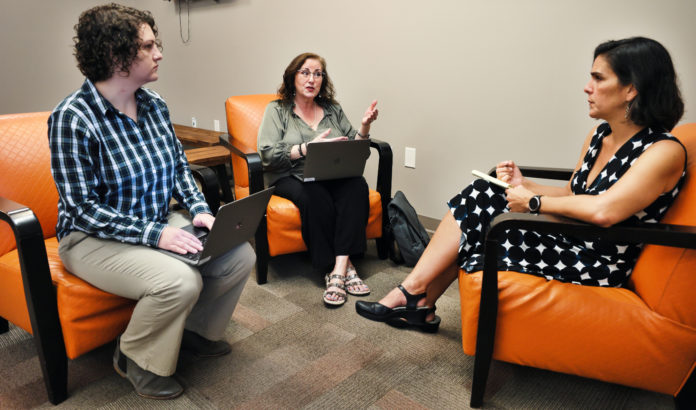
Since being launched in 2012, Mercer’s Center for Collaborative Journalism (CCJ) has grown exponentially in terms of the skills of its students and the strengths of its faculty.
The groundbreaking collaboration among the University, local newspaper and local television and public radio stations, supported by the John S. and James L. Knight and Peyton Anderson foundations, has students, faculty and veteran journalists working together.
Recently, Mercer and the larger community around the University has benefited from an increase in CCJ faculty engaging in their own reporting work while simultaneously preparing the next generation of journalists.
Currently, CCJ faculty members are focused on a variety of different reporting projects including The Macon Newsroom, podcast production, and documentary filmmaking.
The Macon Newsroom
A unique aspect of the CCJ is that it follows the same “teaching hospital” model as a medical school, wherein students achieve education through real-world experience. Journalism majors are required to complete three journalism related internships during their time at Mercer, and most students typically start by writing stories for The Macon Newsroom.
The Macon Newsroom began in September 2019 and currently features two civic journalism fellows and various project specialists. Debbie Blankenship, director of the CCJ, also functions as editor and manager of The Macon Newsroom.
“The Macon Newsroom is my passion project,” Blankenship said. “I mean, it clicks a lot of things in terms of being a vehicle for our students to do professional work and get published. It helps meet information needs in the community, and then it’s just part of Mercer’s larger service learning and responsibility to the Macon community.”
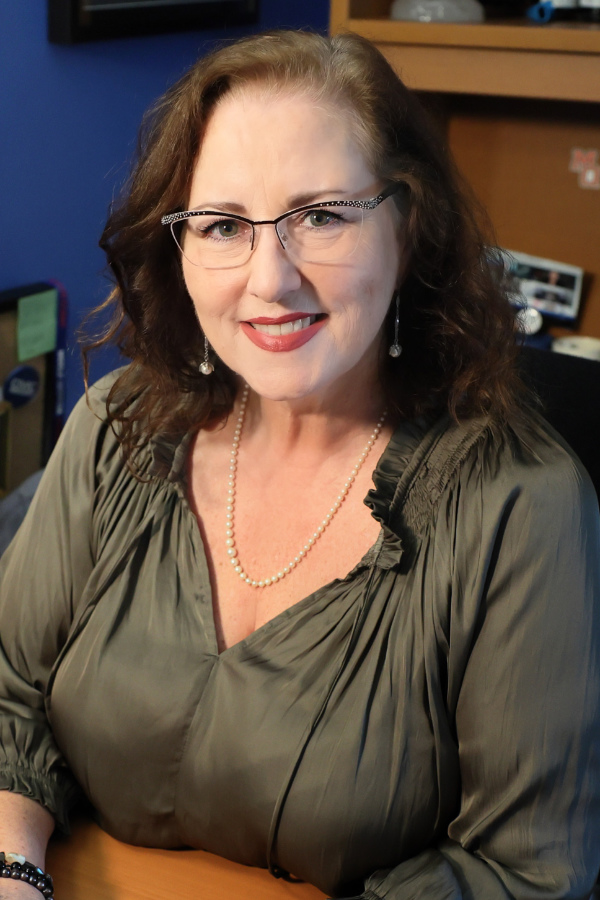
Aside from being an avenue for students to get published early on, The Macon Newsroom primarily functions as a space for journalists to freely and actively report on issues affecting Macon-Bibb County residents. Liz Fabian and Laura Corley are the two fellows focused on government and health/education, respectively.
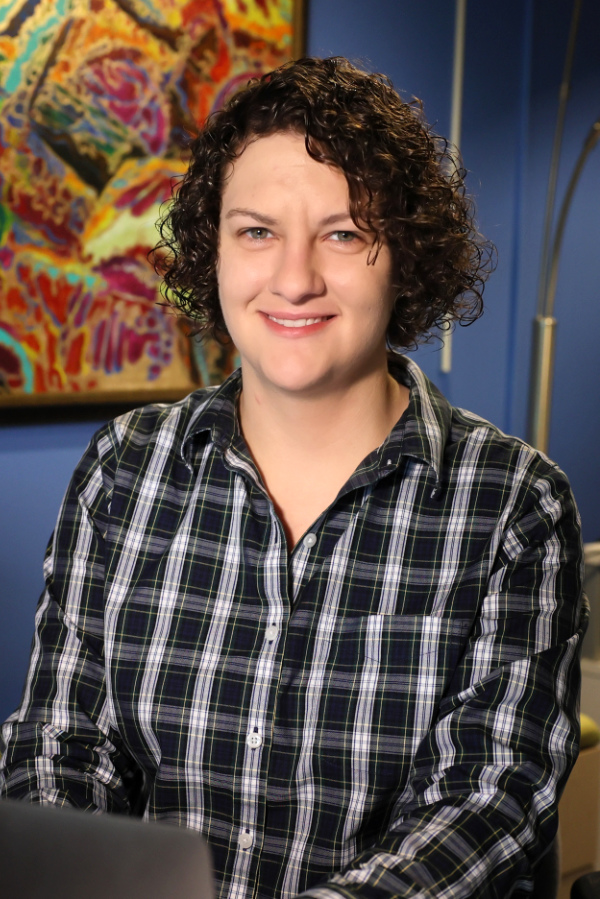
For the past three years, Fabian has dedicated her time as a civic journalism fellow to fill in the gaps left by traditional media who no longer attend many of the government meetings where important local policy is made. She covers the work of all Macon-Bibb County government entities and is sometimes the only reporter in attendance at those meetings.
The newsroom hopes to hire more full-time journalists in the future so that it can begin to cover other facets of the community that may not be considered hard news but are important all the same.
Under Blankenship’s leadership, The Macon Newsroom is proving that there is still a demand for classic, local journalism and a public desire to be well informed.
“We don’t have the restraints that professional media or traditional media organizations have,” Fabian said. “Our partner, Georgia Public Broadcasting is not-for-profit operation, but the Telegraph and WMAZ, they’re for-profit, so they make decisions that maximize their resources and also have an obligation to their shareholders. Whereas we just have an obligation to the people to get them the news that they need.”
Podcasting
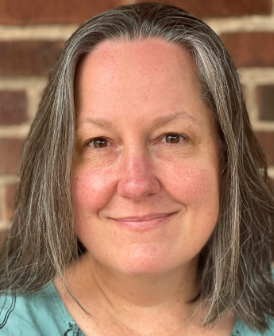
In addition to the traditional reporting work being done in The Macon Newsroom, another form of reporting coming out of the CCJ is the prolific podcasting work of Journalist-in-Residence Tanya Ott. Ott came to Mercer recently with 33 years of experience in radio and seven years of experience in podcasting.
Her first podcast, which she still actively works on, is called The Press Room from Deloitte Insights wherein she discusses developments in performance, business strategy, risk and security and other topics. Due to Deloitte being a global professional services company, Ott maintains conversation on the big issues that businesses have to confront worldwide.
Four years after she started working with Deloitte, Ott turned her focus to history podcasts, inspired by the September 2019 movie Harriet, which chronicled the life of Harriet Tubman.
The following month, Ott and her production company released a podcast, called Following Harriet, created in conjunction with the movie. Her purpose was to inform listeners about Harriet Tubman in a way they had not been taught previously. Following Harriet was the first of many history podcasts she has produced.
“My production partner talked to the folks in Alabama at the state’s tourism agency, and they were on board to do a civil rights podcast. So, we did an Alabama Civil Rights Trail podcast, and then that got the attention of the U.S. Civil Rights Trail. And that rolled into us doing Mississippi, doing Tennessee and other states,” Ott said.
Currently, Ott is working on a podcast for the city of Birmingham, Alabama, called Historic Red Ore Express, where listeners can use a geo-located app to walk around downtown and hear the history of the buildings around them. She has begun working on another podcast of the same concept for another area of the city.
In addition to her own podcasting work, Ott is teaching a class called Advanced Audio for the first time where she will have students produce, from beginning to end, a three-part podcast series. The students’ podcast will focus on 2022 being the 100th anniversary of every woman in Georgia having the right to vote.
When not hosting or teaching others how to make podcasts, Ott also produces them. In May 2020, she began producing a podcast for popular website Allrecipes called Homemade, which celebrates food and different recipes while interviewing well-known professionals like Guy Fieri and Rachel Ray.
Ott hopes to create a podcast at Mercer that would function similarly to the University’s student-run newspaper, The Cluster, wherein students could create and produce episodes on student-focused news.
Documentary filmmaking
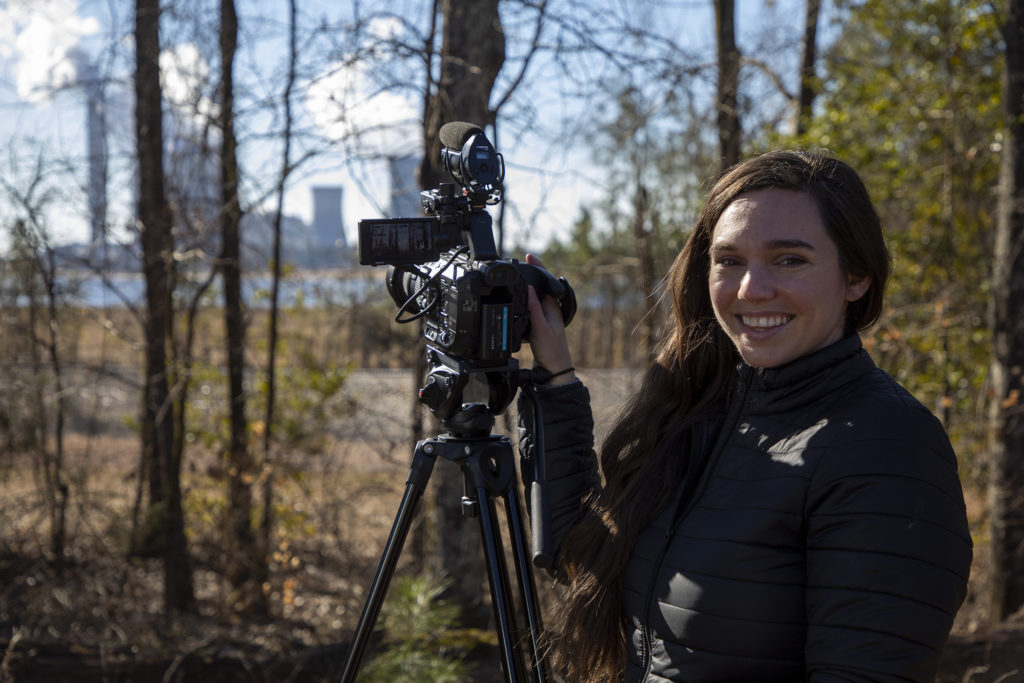
Yet another avenue of reporting coming out of the CCJ is the award-winning documentary filmmaking work of Journalist-in-Residence Evey Wilson Wetherbee, most notably her recent film, “Saving Juliette.”
Wetherbee came to the CCJ with extensive experience in photography and videography. She received her master’s degree in short documentary filmmaking and web design, skills she later used in films she made for Southern Coalition for Social Justice.
In September 2021, Wetherbee and her partners released “Saving Juliette,” which tells the story of a town not far from Mercer that is struggling with finding safe drinking water after it was discovered that the town’s water supply is contaminated with coal ash from a nearby power plant.
Wetherbee spent three months filming in Juliette, during which residents became increasingly aware of the issues with their water supply. She attempted to interview residents but learned that many had signed nondisclosure agreements or received legal counsel to not talk to the press.
“When I became aware of Juliette’s water issues and activism, I knew I had a story of local relevance that I could follow through a natural story arc, capturing residents as they learned about the issues, banded together and shared their personal experiences, and then fought at the Capitol,” Wetherbee said.
As of now, residents of Juliette are tapping into a new county water line. Monroe County recently spent $23 million to extend water services to the town, but coal ash remains a concern for its residents.
“Saving Juliette” won many awards, including the Clarion Award for Television Investigative Feature or Series – Local or Regional. The film was a finalist for the Livingston Award for Local Reporting and was awarded the Audience Choice Award at the Macon Film Festival, to name a few others.
The Livingston Award finalist selection, for which Wetherbee is particularly proud, recognizes outstanding reporting work specifically done by reporters under the age of 35 who are dedicated to journalism.
Wetherbee is currently working on a series of stories about prison conditions in Georgia. Her most recent short documentary project was a story for Georgia Public Broadcasting about a woman named Nancy Masters who lost her son and is now raising her grandson. She is also working on a series about historic homes in Macon.
“I think we have two big missions here. One is to educate the next generation of journalists, content creators and storytellers, and then the second mission is to have a better informed Macon. And I really think that we do that through our faculty’s work,” Blankenship said.








